Amendments to South Korea’s trademark law will save time and money for applicants
28 February 2023

Major changes to the South Korean trademark law have brought excitement to applicants. The first big change, which took effect last August 4, 2022, clarified that the distribution of trademarked digital goods is considered “use” of the trademark, including distribution of such goods through a telecommunications network. This means the law now explicitly protects trademarked digital goods, including digital files such as apps, e-books and emoticons purchased from Apple’s App Store, Google Play or similar sites.
Two changes that took effect on February 4, 2023, will streamline the country’s application process. Under the partial rejection system, the Korean Intellectual Property Office (KIPO) may refuse certain goods or services on an application while allowing registration for the remaining specification of goods or services. In other words, in cases where the applicant is content to abandon the refused goods or services, no further action will be required on their part to have the application registered for the remaining non-problematic goods or services.
The new re-examination system involves cases where a pending application is finally rejected after a notice of preliminary rejection. If reasons for rejection can be easily resolved via amendment of goods or services, an applicant will be able to request re-examination (within three months of final refusal) and simultaneously file an amendment to cure the refusal grounds.
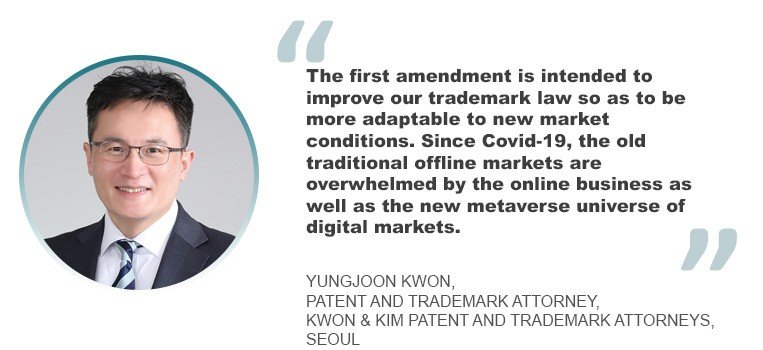
“The first amendment is intended to improve our trademark law so as to be more adaptable to new market conditions, in the new world by the advent of new digital assets such as the NTF, where stakes of on-line business are higher,” explained YungJoon Kwon, a patent and trademark attorney at Kwon & Kim Patent and Trademark Attorneys in Seoul. “Since Covid-19, the old traditional offline markets are overwhelmed by the online business as well as the new metaverse universe of digital markets.”
He added: “The second and third amendments are one of KIPO’s initiatives for making our IP laws and markets more closely conform to the outside market and international trend, [which is] attracting more applications being filed in Korea, in my opinion.”
Digital assets and brand owners
Kwon adds that with the amendments to the trademark law, digital assets with trademarks which are traded online will be more efficiently protected against infringing acts of others’ trademark rights registered for digital assets within the boundaries of the trademark law. This will motivate applicants to see registration in Class 9, which includes information technology equipment and audiovisual equipment, specifically computers and computer software, radios, cameras and phones.
The second amendment will save expenses for the applicant if the applicant wishes to just wait for an allowance decision once the application is partially rejected, he added. “However, even under the new law, if the applicant wishes to accelerate the allowance decision to be issued earlier, proactive deletion or amendment in response to the partial rejection is recommended. [At the same time], the second amendment will require more effort and time for the examiner and the appeal board examiner and will require them to more carefully examine goods to sort the allowed/rejected goods out. The third amendment will have the applicant’s budget saved if the applicant wishes to amend rejected goods following the examiner’s final refusal, without appealing the refusal.”
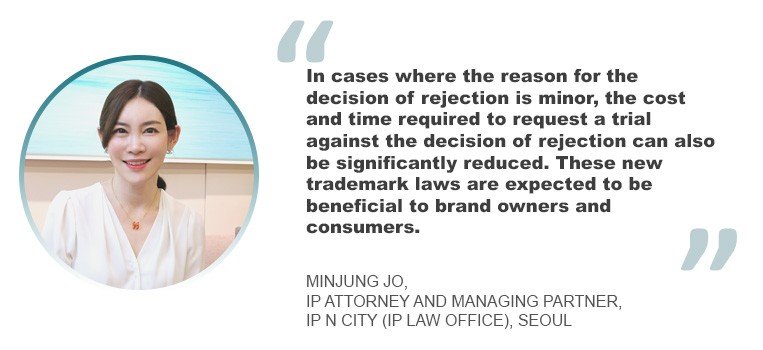
With regards to the partial rejection system, Minjung Jo, an IP attorney and managing partner at IP N CITY (IP Law Office) in Seoul, said that if the designated goods or services for which the reason for refusal is pointed out is not a core designated good or service, the registration decision for the remaining designated goods or services is automatically determined, so the applicant need not respond to the office action, which reduces the applicant’s cost.
“Regarding the re-examination system, in cases where the reason for the decision of rejection is minor, the cost and time required to request a trial against the decision of rejection can also be significantly reduced,” she said. “Therefore, these new trademark laws are expected to be beneficial to brand owners and consumers. This will be similar for foreign brand owners and/or consumers unfamiliar with Korean trademark law.”
“However, of course, if the rejected designated goods or services are important items, they will have to respond through a Korean representative as before,” she said.
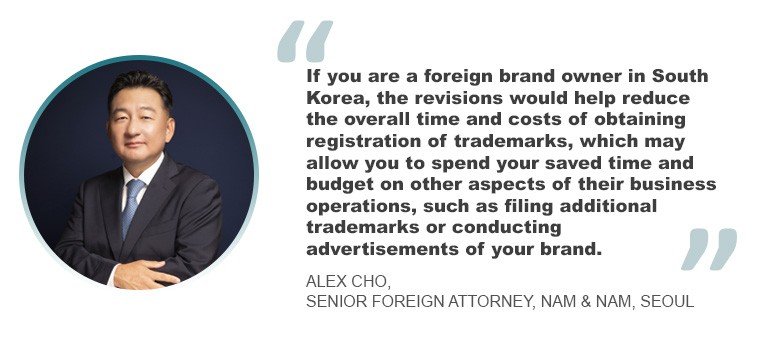
Alex Cho, a senior foreign attorney at Nam & Nam in Seoul, added: “When the revisions relating to the partial rejection system and re-examination system, it is expected that the brand owners can more efficiently conduct prosecution of their trademark applications in South Korea by minimizing the procedures and reducing costs as they try to obtain registration of their marks in South Korea.”
He continued: “In particular, these changes are expected to aid applicants, who are individuals or small- and medium-sized enterprises, who are often unfamiliar with trademark prosecution, in securing trademark rights while also saving time, money and effort that previously had to be spent analyzing trademark examiners’ grounds for refusal. The brand owners should become well aware of such changes so that they can more efficiently prosecute their trademark applications to reduce the time and costs associated with obtaining trademark registrations in South Korea.”
“From the law firm perspective, the above revisions would help to more effectively serve the needs of the firm’s clients – the applicants – by minimizing the procedures and reducing overall costs related to trademark prosecution, considering that many brand owners in the past have complained about the procedures and costs of pursuing the measures of dealing with straightforward rejections, such as deleting of rejected goods or services or amending the rejected goods or services with the filing of an appeal,” he explained. “Is it really necessary to file an appeal when you simply want to amend the rejected goods/service description?”
“If you are a foreign brand owner conducting business in South Korea, the subject revisions would help reduce the overall time and costs of obtaining registration of trademarks in South Korea, which may allow the foreign brand owner to spend their saved time and budget on other aspects of their business operations in South Korea, such as working on filing additional trademarks or conducting advertisements of their brand,” he said.
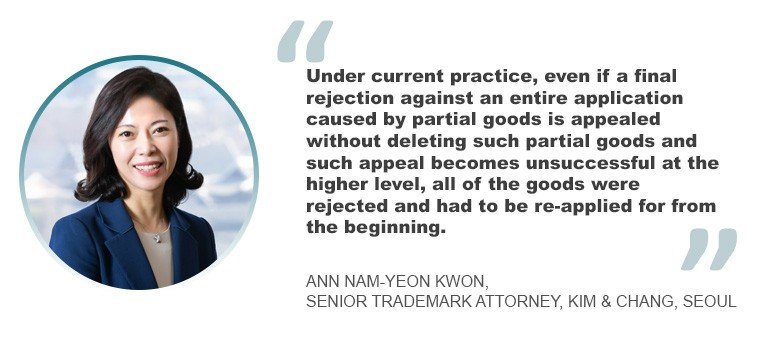
Challenges to the amendments
There are, of course, challenges to these new amendments. “With respect to the partial rejection system, filing with the Intellectual Property Trial and Appeal Board (IPTAB) to simply delete some goods or re-filing new applications to designate only some goods will become unnecessary,” says Ann Nam-Yeon Kwon, a senior trademark attorney at Kim & Chang in Seoul. “Therefore, we think IPTAB appeals or new applications only to delete some designated goods will be reduced. That said, one thing to note is that under current practice, even if a final rejection against an entire application caused by partial goods is appealed without deleting such partial goods and then such appeal becomes unsuccessful at the higher level, all of the goods were rejected and had to be re-applied for from the beginning, which sometimes makes the applicant abandon possible appeals and decide to delete the preliminarily rejected partial goods,” she said.
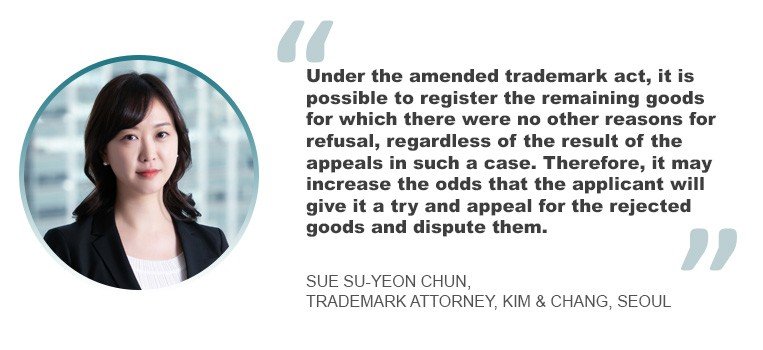
Sue Su-Yeon Chun, a trademark attorney at Kim & Chang, added: “However, under the amended trademark act, it is possible to register the remaining goods for which there were no other reasons for refusal, regardless of the result of the appeals in such a case. Therefore, it may increase the odds that the applicant will give it a try and appeal for the rejected goods and dispute them.”
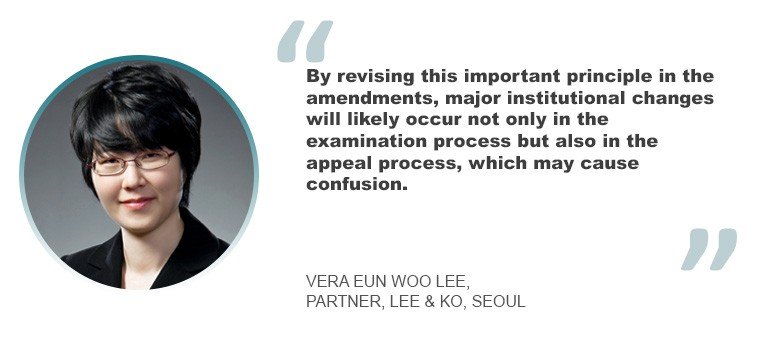
Vera Eun Woo Lee, a partner at Lee & Ko in Seoul, said that the Korean Trademark Act has adhered to the principle of rejecting the entire application even though there is a rejection ground of some product in both the examination and appeal procedures for a long time.
“However, by revising this important principle in the amendments, major institutional changes will likely occur not only in the examination process but also in the appeal process, which may cause confusion,” she explained. “Due to the introduction of the partial rejection system, examiners have to classify and reject only the goods with rejection grounds, so they should examine the designated goods in more detail. Also, due to the introduction of the re-examination request system, the examiner will have to conduct another examination if the applicants request a re-examination. This may lead to an overload of the examiners.”
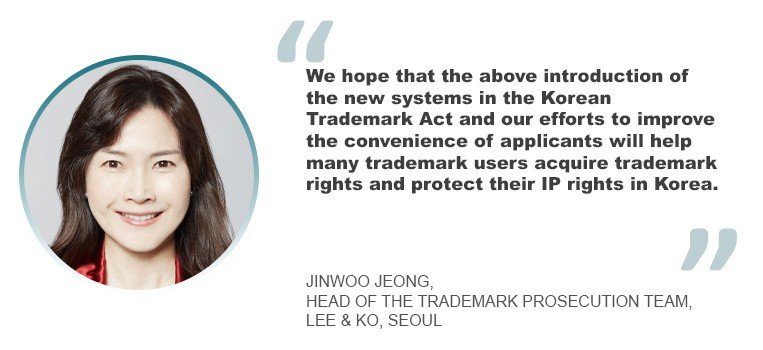
Jinwoo Jeong, head of the trademark prosecution team at Lee & Ko added: “In addition, according to the amendments, discussions on how to specify the subject of the appeal and whether it is possible to accept or reject the appeal with respect to only some goods at the appeal stage are ongoing in IPTAB. Furthermore, IPTAB are discussing the official fees for an appeal which is made for some designated goods.”
“We hope that the above introduction of the new systems in the Korean Trademark Act and our efforts to improve the convenience of applicants will help many trademark users acquire trademark rights and protect their IP rights in Korea,” she said.
The future of the new trademark law
According to Ann Nam-Yeon Kwon, it is necessary to observe more about the specific circumstances where the re-examination system will be used in practice. At any rate, the amendments will contribute much to the general convenience of the applicants and protection of rights.
“Although the Korean Trademark Act basically adopts the principle of first-to-file, use-based elements are continuously being introduced to protect trademark holders who need to be practically protected,” said Jo. “In addition, Korea is continuously reflecting regulations in the revised Korean Trademark Act to ensure that small business owners or small-medium companies with relatively little legal knowledge can better protect their intellectual property rights.”
-Excel V. Dyquiangco






